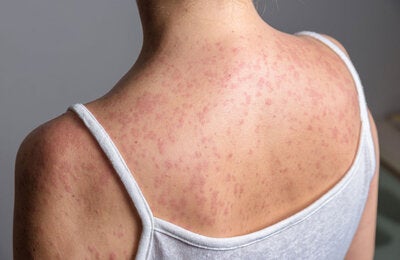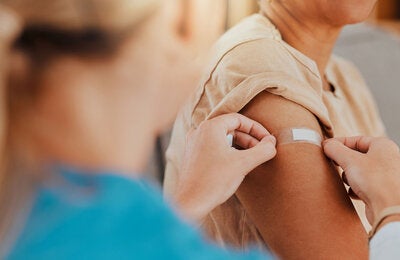

Representatives of international and civil society organizations today agreed to promote major investments in water and sanitation infrastructure in Haiti and the Dominican Republic as the long-term solution to the cholera epidemic in those countries.
Washington, D.C., 29 June 2012 (PAHO/WHO) — Representatives of international and civil society organizations today agreed to promote major investments in water and sanitation infrastructure in Haiti and the Dominican Republic as the long-term solution to the cholera epidemic in those countries.

See more photos of the event
This support was welcomed by Haiti's Minister of Health, Dr. Florence Duperval Guillaume, and the ambassadors of the Dominican Republic and Haiti to the Organization of American States (OAS) during the launch of the new Regional Coalition on Water and Sanitation for the Elimination of Cholera in the Island of Hispaniola. The coalition's objective is to support the two governments in harmonizing and streamlining international support for investments in water and sanitation infrastructure to eliminate cholera from the island.
The Inter-American Development Bank (IDB), the National Health Foundation of Brazil (FUNASA), the U.S. Agency for International Development (USAID), and the Haitian Association of Medical Physicians Abroad, joined the coalition and in urging governments, society, and international agencies to support this initiative for improving access to clean drinking water and sanitation in Haiti and the Dominican Republic. The Pan American Health Organization/World Health Organization (PAHO/WHO), the OAS, CARICOM, UNICEF, the U.S. Centers for Disease Control and Prevention (CDC), the Spanish Agency for International Development Cooperation (AECID), the World Bank, and the Inter-American Association of Sanitary and Environmental Engineering (AIDIS) are the other members of the Regional Coalition.
Haiti's Health Minister, Dr. Florence Duperval Guillaume, said, "The expansion of the Regional Coalition for the elimination of cholera in Haiti and the Dominican Republic, through your commitment today to become an active member today, will serve to strengthen my government's leadership and strong commitment to the elimination of transmission from the Island of Hispaniola over the next 20 years."
PAHO/WHO Deputy Director Dr. Jon K. Andrus praised the members of the coalition for their determination to contribute to national and binational efforts to increase sustainable coverage of high-quality potable water and sanitation for the people of Haiti and the Dominican Republic. "We are looking to expand this coalition and develop a comprehensive plan of action so we can move one step closer to achieving our vision of a cholera-free Hispaniola and a cholera-free Americas," he said.
UNICEF's Regional Director, Bernt Aasen, said in a statement, "Our support will focus on building the capacity of public institutions and mobilizing communities to participate in hygiene and health promotion as well as in keeping water sources clean and safe."
Federico Basañes noted that water and sanitation are high priority for the IDB, which has committed to giving Haiti $200 million per year for the next 10 years. With contributions from Spain, he noted, the IDB will also support water and sanitation projects in Port-au-Prince and other cities
OAS Secretary General José Miguel Insulza said the coalition's meeting was "an important step forward" in helping Haiti and the Dominican Republic move toward a cholera-free Hispaniola.
Flavio Gomes, Executive Director of FUNASA, noted that Brazil had succeeded in controlling cholera within its territory through basic sanitation measures, epidemological surveillance and hygiene, even in the poorest areas of the country. That experience provides the basis for a cholera strategy for Hispaniola that FUNASA is promoting as a member of the Regional Coalition.
Over half a million people in Haiti are estimated to have been sickened by cholera between October 2010 and May of this year, and over 7,000 have lost their lives. The Dominican Republic has reported more than 21,000 cases and over 400 deaths from the disease.
Even before the January 2010 earthquake, only 69% of Haitians had access to clean drinking water. Access to basic sanitation had declined from 26% of the population in 1990 to 17% in 2010. In the Dominican Republic, 86% of the population had access to improved drinking water sources in 2010, and 83% to improved sanitation.
PAHO, which is celebrating its 110th anniversary this year, is the oldest public health organization in the world. It works with every country in the Hemisphere to improve the health and quality of life of the peoples of the Americas and serves as the WHO Regional Office for the Americas.
Links:
- PAHO: Elimination of cholera in Hispaniola
- PAHO: Haiti website
- PAHO: Haiti blog
- Photos from the launch of the Regional Coalition on Water and Sanitation for the Elimination of Cholera in the Island of Hispaniola
- Photographic Exhibition "Water, Health and Hope in Hispaniola"
Contacts:
Donna Eberwine-Villagran, Phone: +1 202 974 3122, Cell: +1 202 316 5469, Sonia Mey-Schmidt, Phone: + 1 202 974 3036, Cell: +1 202 251 2646, Knowledge Management and Communication, PAHO/WHO.



